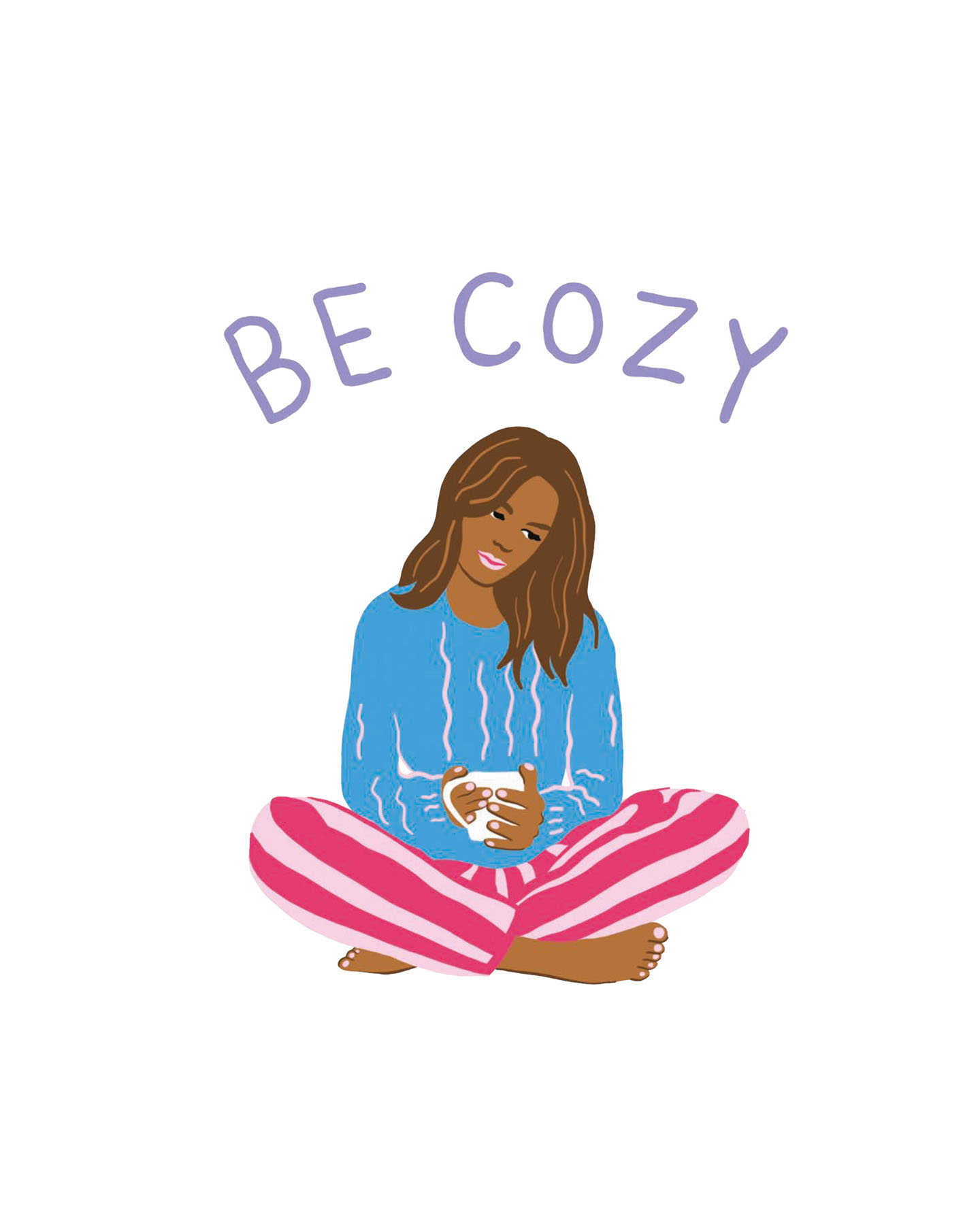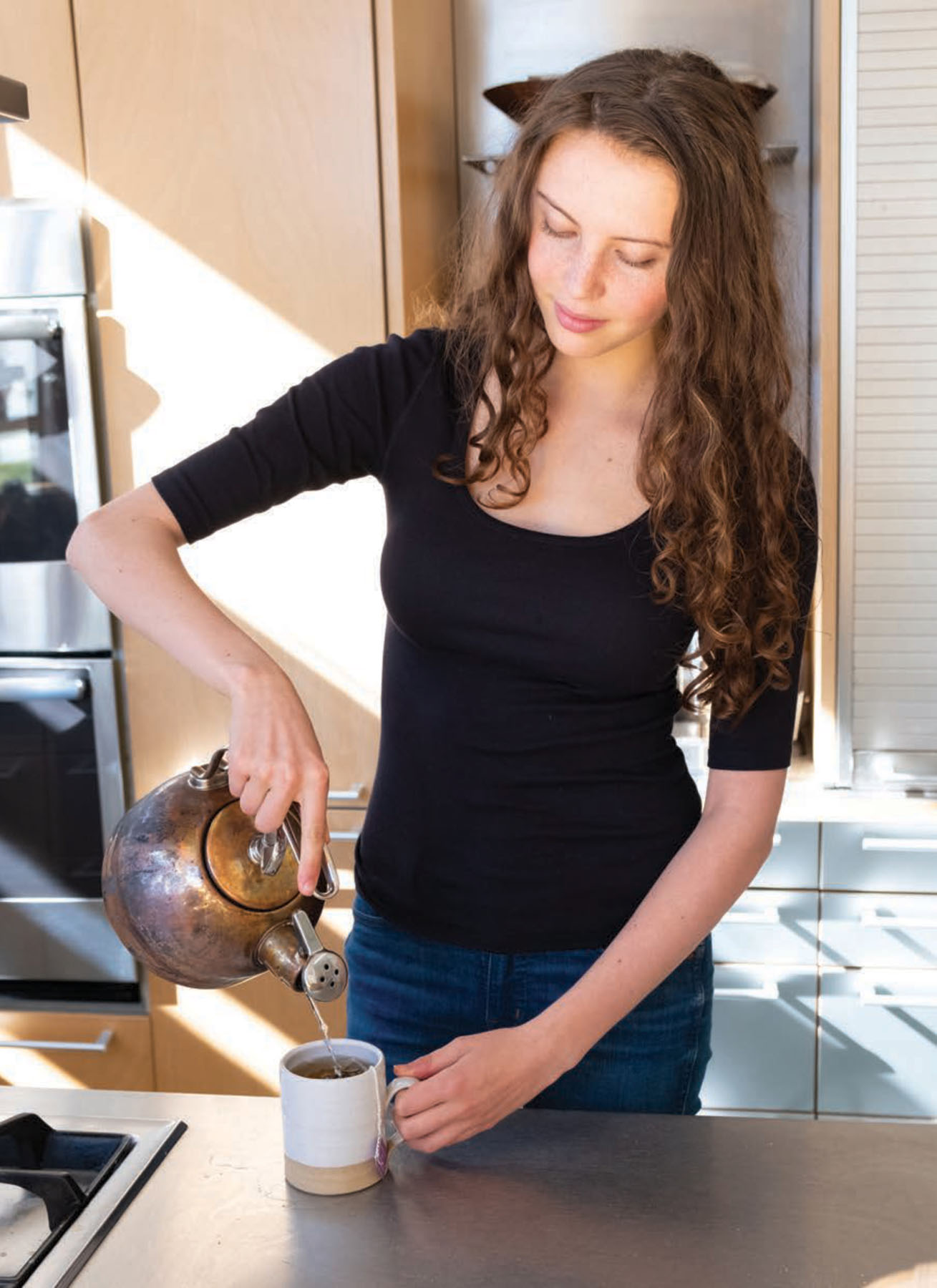
CHAPTER SIX
Be Cozy
Take It Easy
Can you recall the last time you actually felt peaceful and relaxed? How about well rested? For most of us, that means thinking back a really long time. That’s alarming!
I tend to overschedule myself. In my freshman year of high school, I signed up for way too many clubs and activities, on top of all the demanding classes. By the end of each day (usually around midnight), I was exhausted. When I woke up early the next morning to do it all over again, I had no energy whatsoever. I was burned out.
I knew that I couldn’t keep going like that. I desperately needed to slow down and take care of myself. To allow myself to feel cozy—relaxing for its own sake.
Here are some practices I’ve developed over the past few years that help me be cozy and take care of my body and mind.
Habitual Ritual
No matter how busy we are, it’s always possible to take some time to care for ourselves. And contrary to the social media posts of people getting massages and pedicures captioned “self-care,” it doesn’t have to cost anything.
One of my favorite ways to get cozy is with morning and evening rituals. They take anywhere from five minutes to an hour in total—whatever amount of time I can commit to each day.
MORNING
Morning rituals help us connect with body and mind before going out into the world. Spending some cozy time each morning gets us calm, centered, and ready for whatever comes our way.
Personalize your rituals so they feel right for you and your body. They don’t have to be long or difficult. Even five minutes will have a remarkable effect on your day. Here are some morning rituals you can try:
 Stretch it out. Before you get out of bed, do a little stretch to wake up your body.
Stretch it out. Before you get out of bed, do a little stretch to wake up your body.
 Make airplane mode your best friend. Leave your phone off for the first hour (or more!) of each day. This lets you adjust to the morning without being bombarded by information, and it also leaves more time for taking care of yourself.
Make airplane mode your best friend. Leave your phone off for the first hour (or more!) of each day. This lets you adjust to the morning without being bombarded by information, and it also leaves more time for taking care of yourself.
 Have a cup of tea. I love the calming practice of heating up some water, letting the tea steep, then slowly sipping it.
Have a cup of tea. I love the calming practice of heating up some water, letting the tea steep, then slowly sipping it.
 Cook yourself breakfast. My go-to breakfast is three eggs fried in avocado oil, with avocado slices and greens. I love this combo because it has protein, fat, and veggies to keep me going until lunch. Whatever your favorite is, make it a few times each week. I know it sounds stressful to cook on a hectic morning, but it can be quick, and it’s well worth it for how good it makes you feel.
Cook yourself breakfast. My go-to breakfast is three eggs fried in avocado oil, with avocado slices and greens. I love this combo because it has protein, fat, and veggies to keep me going until lunch. Whatever your favorite is, make it a few times each week. I know it sounds stressful to cook on a hectic morning, but it can be quick, and it’s well worth it for how good it makes you feel.
 Meditate. Choose from any of the meditations in this book (Walking Meditation, 10-Minute Body-Scan Meditation, and Seated Meditation) or do one of your own. Meditating in the morning is both calming and invigorating. You can meditate for three minutes or thirty—whatever you have time for.
Meditate. Choose from any of the meditations in this book (Walking Meditation, 10-Minute Body-Scan Meditation, and Seated Meditation) or do one of your own. Meditating in the morning is both calming and invigorating. You can meditate for three minutes or thirty—whatever you have time for.

EVENING
Do you know that feeling when you take a hot bath or shower and then plop down on your bed after a busy day? It’s the pure relief that comes from taking care of yourself. Try setting aside at least a half hour before bed for some therapeutic evening rituals. For example, if you’re aiming to go to bed at 11:00 p.m., finish everything you need to do by 10:30 p.m. at the latest and set aside the last half hour just to relax. Better yet, give yourself a full hour. Here are some evening ritual ideas:
 Take a hot bath. You can spruce up your water with lavender essential oil or Epsom salt for maximum calming vibes. Bathing not only feels relaxing but the heating-then-cooling of our body temperature also helps induce sleep.
Take a hot bath. You can spruce up your water with lavender essential oil or Epsom salt for maximum calming vibes. Bathing not only feels relaxing but the heating-then-cooling of our body temperature also helps induce sleep.
 Flow through some yoga poses. I love getting a good stretch before bed. Bonus: Do the yoga after your bath, when your muscles are warmed up. It feels fantastic.
Flow through some yoga poses. I love getting a good stretch before bed. Bonus: Do the yoga after your bath, when your muscles are warmed up. It feels fantastic.
 Write down your worries. Sometimes I can’t fall asleep for hours because I’m stressing about, well, everything. I have begun a practice of writing down all the things I’m worried about in a notebook. Once they’re on the page, I realize these things are much more insignificant than they seemed in my head.
Write down your worries. Sometimes I can’t fall asleep for hours because I’m stressing about, well, everything. I have begun a practice of writing down all the things I’m worried about in a notebook. Once they’re on the page, I realize these things are much more insignificant than they seemed in my head.
 Cuddle up with a good book. Usually by the end of the day, after reading so many textbooks, I have no desire to read one more page of any book. But I’ve found that carving out at least fifteen minutes to read a good book, just for pleasure, is the most enjoyable and relaxing way to end my day. (There’s nothing better than getting immersed in a good story!)
Cuddle up with a good book. Usually by the end of the day, after reading so many textbooks, I have no desire to read one more page of any book. But I’ve found that carving out at least fifteen minutes to read a good book, just for pleasure, is the most enjoyable and relaxing way to end my day. (There’s nothing better than getting immersed in a good story!)
Sweet Dreams
The worst part of our fast-paced lives is that we never get enough sleep. We go around in a permanent state of semi-exhaustion, every day. I didn’t used to worry about this sleep deprivation. I mean, successful people supposedly say they get by just fine on four or five hours, right? Our society views lack of sleep as a badge of honor!
Society is making a huge mistake, as I recently learned from reading Dr. Matthew Walker’s book Why We Sleep. The book is life-changing. Dr. Walker shows that getting enough sleep is way more important than we ever knew. Sleep-deprived people get injured more, perform worse in sports, and score lower on tests. (I can attest to this! My SAT scores plummeted when I took the test after a bad night’s sleep.) On less than five hours of sleep, we are 4.3 times more likely to get in a car accident than with a full night’s sleep. We have higher risks of getting cancer, Alzheimer’s disease, obesity, and diabetes. Not getting enough sleep also makes us more prone to depression and suicidal thoughts. Sleep deprivation is actually a life-and-death matter.
The flip side, though, is good news: If we do start getting enough sleep, our lives can transform. We’ll fend off illness better, do better academically, improve athletically, and have better memories. When we finally get enough sleep, we become superheroes.
So how much sleep is “enough”? Dr. Walker says average adults need about eight hours. But teenagers need a lot more: a whopping nine to ten hours every night! That probably sounds ridiculous to you—it seems as though there just aren’t enough hours in the day.
But we so badly need the sleep. So I propose a happy medium: somehow, we must get a minimum of eight hours of sleep, every night. Our lives depend on it.
Q&A
Q: I would love to get a full night’s sleep, but that’s just not realistic. How am I supposed to get eight hours, between early school start times, sports practice, and hours of homework?
A: It’s doable. I find the most helpful thing to do is to stay off my phone at night. Ever since I’ve started doing this, my sleep is much stronger. It can be tempting to check Instagram one last time before turning off the light, but don’t do it! The blue light from our devices interrupts our melatonin production, which makes it harder to sleep. Plus, all the content we see on our phones stimulates our brains and keeps us from being able to wind down. Try airplane mode at least two hours before bedtime. It works wonders.
It also helps to get as much done as possible before it gets late. That means writing your essay at 7:00 p.m., instead of 1:00 a.m.! We have to be conscious of the time we spend after school lets out, taking advantage of it and not procrastinating our work. This might mean not watching a show or scrolling through social media right after we get home, and doing our assignments first.
Added bonus: Research shows that a full night’s sleep improves our test scores more than staying up late cramming does. We retain the information better, and we actually learn while we sleep. So coziness really pays off!